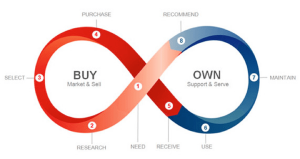
The *real* Internet of Things
Part II of my minutes of the private Youstice meeting which took place in Prague on October 18-19, 2014 is devoted to another subject: the Internet of things.
“The more we can experience owning our own lives, the more beneficial technology can be for us” (Doc Searls)

The Internet of things is, in my honest to God opinion, a very weird topic. First and foremost, it’s as old a theme as the Internet itself. I first started to hear about connected fridges in 1996, even though it never quite happened[1] and the subject has re-emerged a few times since then. At the same time, we are already confronted with the Internet of things: who doesn’t have a Smartphone, a connected watch and/or a heart sensor for their Sunday morning run? And lastly, the real Internet of Things might well end up being something entirely different. Who knows? That was exactly Doc Searls’s point in Prague last Saturday, when the co-creator of the Cluetrain manifesto described his own vision of things to come.
“It’s a little like 1978” Doc said: “we were then talking about personal computing and we were then offered several kinds of standards which we ended up not using. “Right now we have a similar situation” he went on: “it’s the Google of things, the Facebook of things, and Amazon and things etc. and amongst those, it’s mostly Google’s and Amazon’s that are the most coherent”.
Yet, maybe our efforts are doomed to failure if all that can possibly be connected through the Internet Protocol is indeed connected and we haven’t thought about the customer journey: “Esteban Kolsky turned the buy cycle upside down” Doc Searls went on. “We have all these things we own and they all have their identity. The way marketing sees it is that we buy all the time whereas we tend to own more things than we buy.

Above: Esteban Kolsky’s diagram taken from his blog[2]
Ownership, experience are all of the essence, we are not just into buying, and a lot of experience is gained over time only, once we have grown used to things and have used them; even the very fact that we like products or not fluctuates over time.